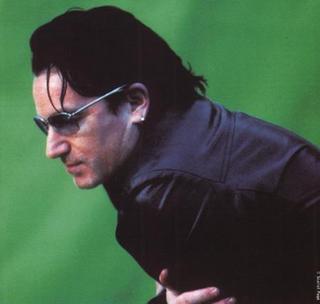
I lifted this from looking closer via Times & Seasons.
Excerpt from Bono: In Conversation with Michka Assayas.
Assayas: Appalling things seem to happen when people become religious at too early an age or when their experience of life is nonexistent. Don't you think?
Bono: Zealots often have no love for the world. They're just getting through it to the next one. It's a favorite topic. It's the old cliché: "Eat sh-- now, pie in the sky when you die." But I take Christ at his word: "On Earth as it is in Heaven." As to the first part of your question, in my experience, the older you get, the less chance you have to transform your life, the less open you are to love in a challenging way. You tend towards love that's more comforting and safe.
Assayas: As I told you, I think I am beginning to understand religion because I have started acting and thinking like a father. What do you make of that?
Bono: Yes, I think that's normal. It's a mind-blowing concept that the God who created the Universe might be looking for company, a real relationship with people, but the thing that keeps me on my knees is the difference between Grace and Karma.
Assayas: I haven't heard you talk about that.
Bono: I really believe we've moved out of the realm of Karma into one of Grace.
Assayas: Well, that doesn't make it clearer for me.
Bono: You see, at the center of all religions is the idea of Karma. You know, what you put out comes back to you: an eye for an eye, a tooth for a tooth, or in physics—in physical laws—every action is met by an equal or an opposite one. It’s clear to me that Karma is at the very heart of the Universe. I’m absolutely sure of it. And yet, along comes this idea called Grace to upend all that “as you reap, so will you sow” stuff. Grace defies reason and logic. Love interrupts, if you like, the consequences of your actions, which in my case is very good news indeed, because I’ve done a lot of stupid stuff.
Assayas: I’d be interested to hear that.
Bono: That’s between me and God. But I’d be in big trouble if Karma was going to finally be my judge. I’d be in deep sh--. It doesn’t excuse my mistakes, but I’m holding out for Grace. I’m holding out that Jesus took my sins onto the Cross, because I know who I am, and I hope I don’t have to depend on my own religiosity.
Assayas: The son of God who takes away the sins of the world. I wish I could believe in that.
Bono: But I love the idea of the Sacrificial Lamb. I love the idea that God says: Look, you cretins, there are certain results to the way we are, to selfishness, and there’s mortality as part of your very sinful nature, and let’s face it, you’re not living a very good life, are you? There are consequences to actions. The point of the death of Christ is that Christ took on the sins of the world, so that what we put out did not come back to us, and that our sinful nature does not reap the obvious death. That’s the point. It should keep us humbled… It’s not our own good works that get us through the gates of Heaven.
Assayas: That’s a great idea, no denying it. Such great hope is wonderful, even though it’s close to lunacy, in my view. Christ has his rank among the world’s great thinkers. But Son of God, isn’t that farfetched?
Bono: No, it’s not farfetched to me. Look, the secular response to the Christ story always goes like this: he was a great prophet, obviously a very interesting guy, had a lot to say along the lines of other great prophets, be they Elijah, Muhammad, Buddha, or Confucius. But actually Christ doesn’t allow you that. He doesn’t let you off that hook.
Christ says, No. I’m not saying I’m a teacher, don’t call me teacher. I’m not saying I’m a prophet. I’m saying: "I’m the Messiah." I’m saying: "I am God incarnate." And people say: No, no, please, just be a prophet. A prophet we can take. You’re a bit eccentric. We’ve had John the Baptist eating locusts and wild honey, we can handle that. But don’t mention the “M” word! Because, you know, we’re gonna have to crucify you. And he goes: No, no, I know you’re expecting me to come back with an army and set you free from these creeps, but actually I am the Messiah.
At this point, everyone starts staring at their shoes, and says: Oh, my God, he's gonna keep saying this. So what you’re left with is either Christ was who He said He was—the Messiah—or a complete nutcase. I mean, we’re talking nutcase on the level of Charles Manson. This man was like some of the people we’ve been talking about earlier. This man was strapping himself to a bomb, and had "King of the Jews" on his head, and they were putting him up on the Cross, was going: OK, martyrdom, here we go. Bring on the pain! I can take it. I’m not joking here.
The idea that the entire course of civilization for over half of the globe could have its fate changed and turned upside-down by a nutcase, for me that’s farfetched…

 Bono on Grace and Jesus Christ
Bono on Grace and Jesus Christ













































